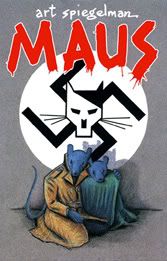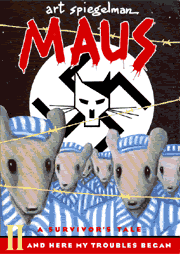Comic Book Reviews -- Maus I & II (1992)
Author: Art Spiegelman


Before anyone says it, no I'm not combining these two in the same review as a cop out, but because they're meant to be read back to back as if one book, so they should be reviewed together as if one book.
That out of the way, I'm guessing everybody here knows about this one thing called the Holocaust leading to millions of Jews being murdered. Even though we know, sometimes more than enough, about the major historical event, we never stop watching movies, television specials, or reading books and novels about it. Art Spiegelman has taken a little bit of a different approach to the Holocaust, by creating a story that's not directly about the concentration camps, and also presents it in the form of a comic book, which to my knowledge has not been done often (or at all). Whereas in movies like Schindler's List we get vivid, gruesome images of the Jews being slaughtered or starved, the drawings in Maus leave more up to the imagination, which works well based upon what we know happened. Now, I know someone's bound to point out that Schindler's List was made after these comic books, but the point remains the same with whatever movie or television program you want to use. Also, another brilliant touch is the portrayal of humans as animals, with the Jews being rats and the Germans being cats. So the symbolic cat vs. mouse theme works, but it's also part of Spiegelman's implication of the Nazi propaganda telling Germans how the Jews are like rats in that they spread disease, and must be exterminated.
The storyline for Maus works well because of the layering. We get a story inside of a story inside of a story. Art Spiegelman the author makes Artie Spiegelman the mouse, visiting his father Vladek Spiegelman (whom I believe was a real life survivor of the Holocaust, hence the motive to write the comic books) to record a eye witness account of the Holocaust. Then we get the reaccounting of events from Vladek, starting in Maus I with Vladek meeting Anja, Artie's mother, and Vladek's involvement in World War II as a solider and eventuall as a prisoner of war. Within that we get the story of Artie and his wife Francoise trying to help Vladek survive the terror even decades after it has happened, but at the same time survive with the guilt they feel for not being supportive enough. That can sound complicated reading about it but it is actually very easy to follow, well mostly because of the nature of comic books and visual reading. Regular comic book fans as well as nonregulars should appreciate the layering of the stories in both books, as it helps the pacing of the story and also add enough complexity instead of straight up memoirs of a Holocaust survivor.
So Maus I "ends" so to speak in the middle of Vladek's story and Maus II gets to more of the actual violence and more vivid tellings of the living conditions in Auschwitz and Auschwitz II (Birkenau). Maus I serves more of an introduction to how Vladek still keeps the Holocaust near in his mind, and unfortunately uses it to pull sympathy from people to his advantage. Scenes such as this when we see him negotiate grocery prices (a single box of cereal for crying out loud) humanizes the aftermath of the Holocaust. Survivors of the major tragedy deserve to have sympathy from people around the world, but the story of Vladek shows sympathy isn't a right. Vladek even holds prejudice of his own, so later in Maus II we see that even after all the horrible events he's suffered through, Vladek has a bad side as well, yet he's blind to it. It's a hard fact to accept, but it exists. Vladek is still an overall good person (or so we want to believe) even if he has his little quirks like saving all the money he can and constantly complains about his wife yet does nothing about it. The actual story of surviving the Holocaust holds lots of emotion in it, but the real moral of the story lays in the most outside narrative, with Francoise and Artie surviving the aftermath with Vladek.
So even though we may know more than we care to about the Holocaust, no abundance of knowledge devalues the quality of work of Maus. It offers new insight to the survivors of the Holocaust and is more than just another tragic story of Jews being persecuted for something they haven't done. The story of Vladek in the camps still should hold your attention due to the real first hand account being incorporated into it, but don't expect Maus to be simply a story about Nazi Germany.
A (for both, if they must be indexed separately)


Before anyone says it, no I'm not combining these two in the same review as a cop out, but because they're meant to be read back to back as if one book, so they should be reviewed together as if one book.
That out of the way, I'm guessing everybody here knows about this one thing called the Holocaust leading to millions of Jews being murdered. Even though we know, sometimes more than enough, about the major historical event, we never stop watching movies, television specials, or reading books and novels about it. Art Spiegelman has taken a little bit of a different approach to the Holocaust, by creating a story that's not directly about the concentration camps, and also presents it in the form of a comic book, which to my knowledge has not been done often (or at all). Whereas in movies like Schindler's List we get vivid, gruesome images of the Jews being slaughtered or starved, the drawings in Maus leave more up to the imagination, which works well based upon what we know happened. Now, I know someone's bound to point out that Schindler's List was made after these comic books, but the point remains the same with whatever movie or television program you want to use. Also, another brilliant touch is the portrayal of humans as animals, with the Jews being rats and the Germans being cats. So the symbolic cat vs. mouse theme works, but it's also part of Spiegelman's implication of the Nazi propaganda telling Germans how the Jews are like rats in that they spread disease, and must be exterminated.
The storyline for Maus works well because of the layering. We get a story inside of a story inside of a story. Art Spiegelman the author makes Artie Spiegelman the mouse, visiting his father Vladek Spiegelman (whom I believe was a real life survivor of the Holocaust, hence the motive to write the comic books) to record a eye witness account of the Holocaust. Then we get the reaccounting of events from Vladek, starting in Maus I with Vladek meeting Anja, Artie's mother, and Vladek's involvement in World War II as a solider and eventuall as a prisoner of war. Within that we get the story of Artie and his wife Francoise trying to help Vladek survive the terror even decades after it has happened, but at the same time survive with the guilt they feel for not being supportive enough. That can sound complicated reading about it but it is actually very easy to follow, well mostly because of the nature of comic books and visual reading. Regular comic book fans as well as nonregulars should appreciate the layering of the stories in both books, as it helps the pacing of the story and also add enough complexity instead of straight up memoirs of a Holocaust survivor.
So Maus I "ends" so to speak in the middle of Vladek's story and Maus II gets to more of the actual violence and more vivid tellings of the living conditions in Auschwitz and Auschwitz II (Birkenau). Maus I serves more of an introduction to how Vladek still keeps the Holocaust near in his mind, and unfortunately uses it to pull sympathy from people to his advantage. Scenes such as this when we see him negotiate grocery prices (a single box of cereal for crying out loud) humanizes the aftermath of the Holocaust. Survivors of the major tragedy deserve to have sympathy from people around the world, but the story of Vladek shows sympathy isn't a right. Vladek even holds prejudice of his own, so later in Maus II we see that even after all the horrible events he's suffered through, Vladek has a bad side as well, yet he's blind to it. It's a hard fact to accept, but it exists. Vladek is still an overall good person (or so we want to believe) even if he has his little quirks like saving all the money he can and constantly complains about his wife yet does nothing about it. The actual story of surviving the Holocaust holds lots of emotion in it, but the real moral of the story lays in the most outside narrative, with Francoise and Artie surviving the aftermath with Vladek.
So even though we may know more than we care to about the Holocaust, no abundance of knowledge devalues the quality of work of Maus. It offers new insight to the survivors of the Holocaust and is more than just another tragic story of Jews being persecuted for something they haven't done. The story of Vladek in the camps still should hold your attention due to the real first hand account being incorporated into it, but don't expect Maus to be simply a story about Nazi Germany.
A (for both, if they must be indexed separately)